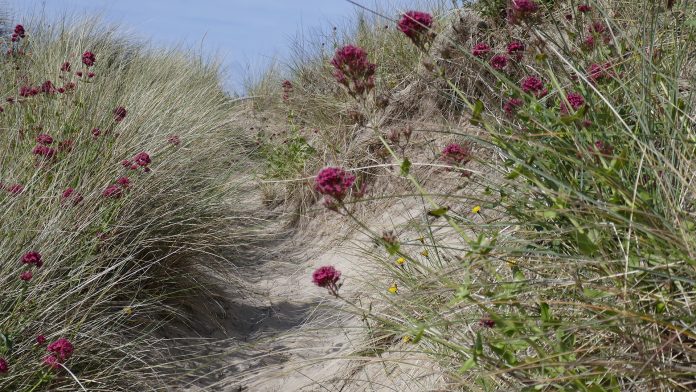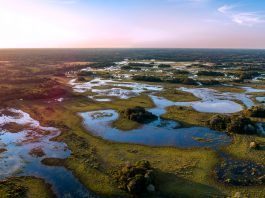Cattle in Lincolnshire have been equipped with novel smart collars to aid the enhancement of important sand dune habitats.
A herd of cows, that arrived at their summer grazing grounds, have been given a significant job to do: they are a vital component of a project known as ‘Dynamic Dunescapes’, which seeks to re–establish 7,000 hectares of coastal sand dune habitats in England and Wales.
The importance of sand dune habitats
Thriving sand dune habitats are required to provide homes for a multiplicity of specialised and exceptional wildlife, such as fen orchid, natterjack toad and sand lizard.
It is essential for healthy sand dunes to be free to move and be dynamic. Many species need areas of open sand to flourish, so the project will bring life back to the dunes by establishing areas of open sand. Other specialised creatures need us to improve the dune slacks, as these often water-filled dips behind the dunes are important habitats for amphibians and birds. Invasive species will also be removed from the dunes and dune grasslands, to improve conditions for rare native plants to flourish.
Currently, the majority of sand dune habitats are overrun with vegetation, and consequently, sand dunes are one of the most endangered habitat types in Europe for biodiversity loss.
Bovine climate protectors
Cows can have a positive impact on these threatened ecosystems, grazing and trampling to help mitigate the overgrown vegetation. As they graze, they curl their tongues around the grass, pulling it up to form tussocks, which offer an ideal micro-habitat for a wide range of invertebrates. As well as this, they break up sections of heavy vegetation, and their footfall builds areas of bare ground that are required by dune habitats.
Even their faeces offers a unique benefit as it is a vital resource for many invertebrates, such as dung beetles, which aid in efforts to recycle the nutrients into the soil.
Unique smart technology
For the first time on the reserve, a team from Natural England are using Nofence technology to assist in directing the cows to grazing areas. The cattle are equipped with a novel type of collar which contains a GPS tracker. Reserve managers at Saltfleetby Theddlethorpe National Nature Reserve can then use their can mobile phones to manage where these helpful herds graze.
Reserve managers can ‘draw’ out the boundary of a virtual fence. The cattle’s collars will alert the cows with a sound cue followed by a small, innocuous pulse the closer they get to the virtual fence, meaning they stay within the planned areas.
Guy Mason, Natural England reserve manager at Saltfleetby Theddlethorpe National Nature Reserve, commented:
“Nofence was developed with Norwegian farmers and has piqued interest in the UK in a big way.
“I’m very excited about trialling this new technology. I imagine that any reserve officer would welcome the chance to plan some focused grazing, so I feel very fortunate that I get to try just that. These collars will also make it really easy for me to monitor the herd.”
The cattle will graze across Saltfleetby Theddlethorpe National Nature Reserve, beginning at the north of the site and making their way south. Their sizeable grazing area will still be surrounded by physical fences. However, this technology can assist in simply guiding the herd to different areas in this space. This will enable their conservation efforts to be tailored to the reserve’s requirements at different periods during the summer.
People visiting the reserve may spot the herd and their new high-tech neck gear and are asked to: look out for ant signs; keep dogs on short leads around the herds; and stay on marked paths and maintain a distance from the cows.
Dynamic Dunescapes is a collaborative project aiming to restore sand dunes across England and Wales. This is being carried out for the benefit of wildlife, people and communities. It is funded by the National Lottery Heritage Fund and the EU LIFE Programme. Project partners are Natural England, Plantlife, National Trust, Natural Resources Wales, Cornwall Wildlife Trust, Lincolnshire Wildlife Trust and Cumbria Wildlife Trust.









